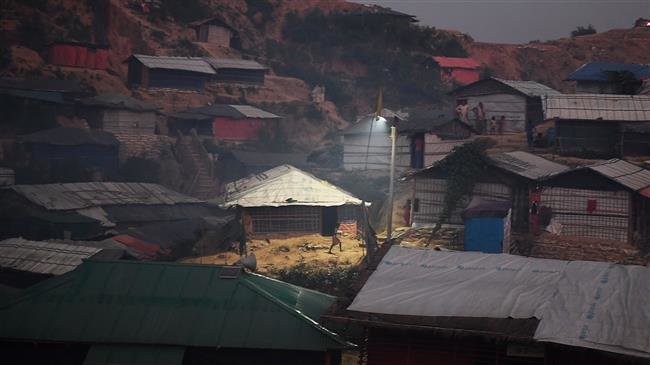Bangladesh detains 10 Rohingya refugees heading for Malaysia


Bangladeshi police have arrested 10 Rohingya refugees before boarding a boat bound for Malaysia, an official says.
Over 700,000 Rohingya fled to Bangladesh last year after Myanmar’s armed forces, backed by Buddhist extremist mobs, intensified a crackdown that had already been underway against the Muslim community in Rakhine. Since then, they have been living in poor conditions in camps in southeast Bangladesh.
The elite Rapid Action Battalion (RAB) said on Friday that six young women and four men were detained at Shah Porir Dwip on Thursday night.
The 10 people were stopped before they could board a vessel on the Naf river estuary dividing Bangladesh and Myanmar.
“They were about to head to Malaysia through the Bay of Bengal. The girls won’t be aged more than 22 years. They were tempted that they can get married with well-off persons in Malaysia,” RAB Cox’s Bazar chief Mahedi Hasan told AFP.
Tens of thousands of Rohingya have been languishing in internal displacement camps since a previous wave of violence in 2012.
Thousands of Rohingya Muslims were killed, injured, arbitrarily arrested, or raped by Myanmarese soldiers and Buddhist mobs mainly between November 2016 and August 2017, when the surviving members of the community started fleeing to Bangladesh en masse.
The Rohingya Muslims, who have lived in Myanmar for generations, are denied citizenship and are branded illegal emigrants from Bangladesh, which likewise denies them citizenship.
For years, the persecuted Rohingya in Myanmar and Bangladesh have embarked on dangerous journeys aboard rickety vessels to Thailand and Malaysia, looking for better conditions. Most of the voyages have taken place in the dry months between November and March, when the sea is calm.
Earlier this month, the Bangladeshi coastguard stopped a boat in the Bay of Bengal carrying 33 Rohingya to Malaysia.
Also in November, Myanmar’s authorities intercepted three boats with scores of Rohingya Muslims who were fleeing apartheid conditions at internal displacement camps in Rakhine State and heading to Malaysia.
According to the Bangladeshi official, the women paid $100 each to smugglers and the men paid about $250. “Each of them were supposed to pay another 200,000 taka (nearly $2,500) once the boat crosses Thai waters,” Hasan said.
Two of those arrested on Thursday came to Bangladesh from Myanmar in 2000-2001, while the rest were among those who have fled after the military crackdown last year.
He added that police also arrested a Bangladeshi trafficker.








